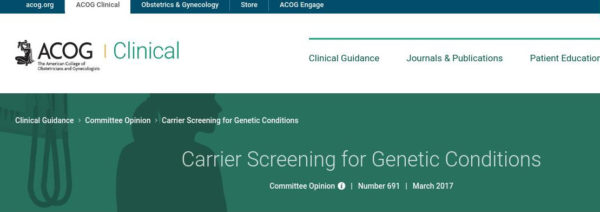American College of Obstetrics and Gynecology (ACOG) recommends carrier genetic screening.
In the March issue of Obstetrics & Gynecology journal published by the American College of Obstetrics and Gynecology (ACOG) there are two committee opinions that recommend expanded carrier screening for recessive genetic disorders.
This is due to the lower costs of expanded testing in our current age of “Genomic Medicine.” Pre-conception genetic screening gives future parents valuable information as there are currently commonly employed technologies that can prevent the birth of an affected child. Couples have the very viable option of Pre-implantation Genetic Disease (PGD) screening of embryos through “in vitro” fertilization procedures. The committee opinions are well written and I plan to use them as part of my informed consent process.
First, some basic notions:
” Carrier genetic screening is a term used to describe genetic testing that is performed on an individual who does not have any overt phenotype for a genetic disorder but may have one variant allele within a gene(s) associated with a diagnosis. Information about carrier screening should be provided to every pregnant woman. Carrier screening and counseling ideally should be performed before pregnancy because this enables couples to learn about their reproductive risk and consider the most complete range of reproductive options. A patient may decline any or all screening.”
Fair enough. It makes a lot of sense to be informed beforehand about any adversity you might encounter on your path.
” When an individual is found to be a carrier for a genetic condition, his or her relatives are at risk of carrying the same mutation. The patient should be encouraged to inform his or her relatives of the risk and the availability of carrier genetic screening. If an individual is found to be a carrier for a specific condition, the patient’s reproductive partner should be offered testing in order to receive informed genetic counseling about potential reproductive outcomes. If both partners are found to be carriers of a genetic condition, genetic counseling should be offered. “
Here is an excerpt from the committee’s recommendations:
- Ethnic-specific, pan-ethnic, and expanded carrier screening are acceptable strategies for prepregnancy and prenatal carrier screening. Each obstetrician–gynecologist or other health care provider or practice should establish a standard approach that is consistently offered to and discussed with each patient, ideally before pregnancy. After counseling, a patient may decline any or all carrier screening.
- If a patient requests a screening strategy other than the one used by the obstetrician–gynecologist or other health care provider, the requested test should be made available to her after counseling on its limitations, benefits, and alternatives.
- All patients who are considering pregnancy or are already pregnant, regardless of screening strategy and ethnicity, should be offered carrier screening for cystic fibrosis and spinal muscular atrophy, as well as a complete blood count and screening for thalassemias and hemoglobinopathies. Fragile X premutation carrier screening is recommended for women with a family history of fragile X-related disorders or intellectual disability suggestive of fragile X syndrome, or women with a personal history of ovarian insufficiency. Additional screening also may be indicated based on family history or specific ethnicity.
Essentially, their recommendations are all common sense: gather all information that’s possible at the moment, consult with a specialist, get clear understanding of the meaning of it, make your informed decision.
The committee opinions are clear and very well written. Our Clinic has been on the forefront of pre-implantation genetic testing (both, genetic screening and genetic diagnosis) for our patients from the very beginning. And as I commented earlier, we plan to use the recommendations as part of our informed consent process.
You can read the ACOG Journal here.



